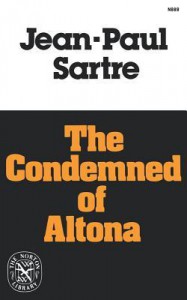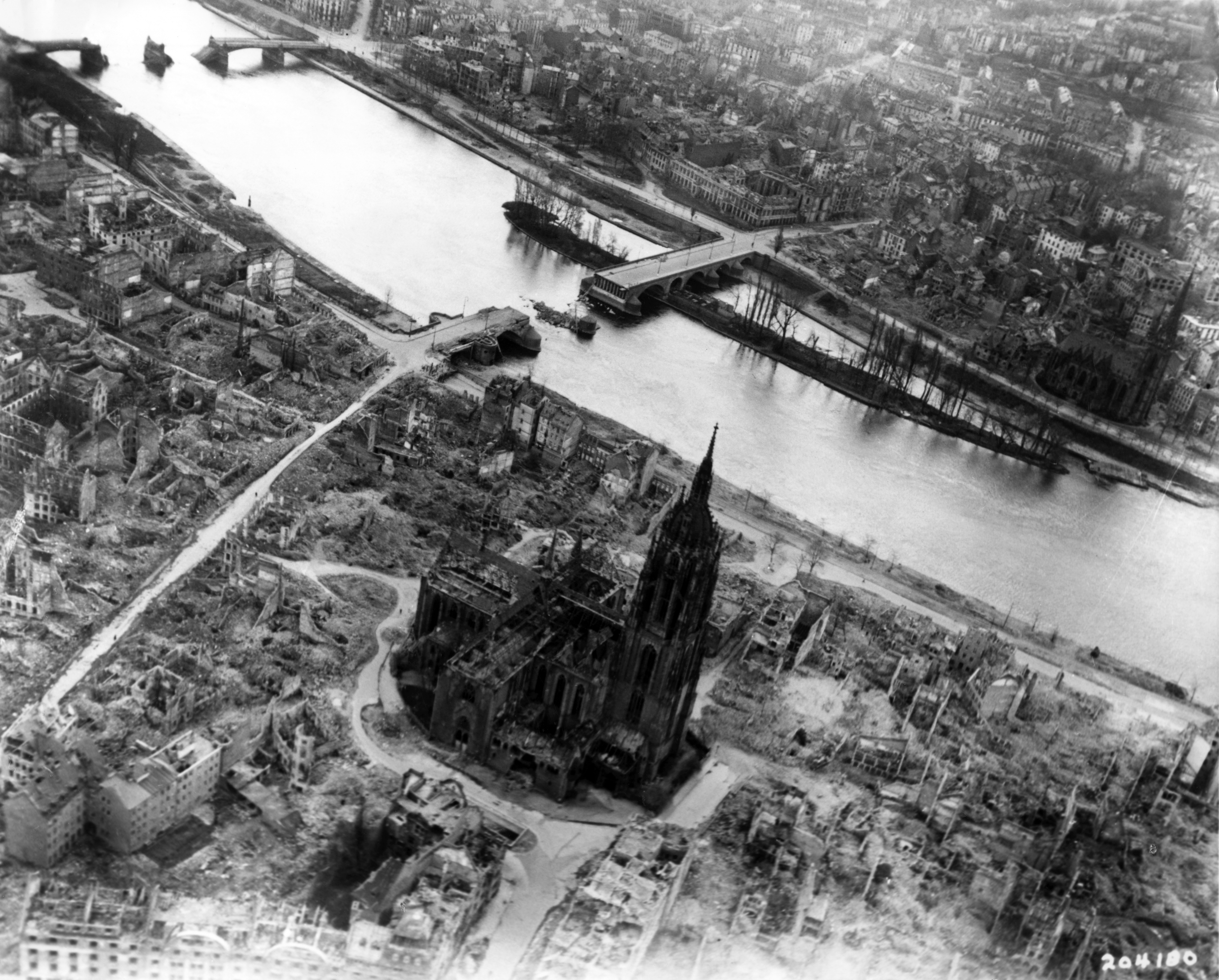Germany's Existential Crisis

It turned out that it was quite appropriate that I started reading this play when I did, especially since I had no idea what it was about beforegand. At the time I was heading out of the Netherlands and into Belgium and had just past through Rotterdam (and spent a couple of hours there) to discover that the city is nothing like many of the other European cites but rather a modern city with basically no old city like many of the others have (including the German cities). Also, having visited some of the sites in northern France (including a Nazi bunker for the V2 rockets that has been turned into a museum of science, technology, and war) it did feel appropriate that I read the one Satre play that was about Germany attempting to deal with its war guilt.
The thing is that the Nazi's did leave quite a trail of destruction in there wake, as can be seen from the photo of Rotterdam after the blitz (basically the Dutch turned out to be a lot more resistant they originally expected so they bombed the hell out of Rotterdam and told them that if they didn't surrender then Utrecht would be next – they surrendered).

Mind you, Dunkerque wasn't spared either, but that's not surprising considering that this was where the allied forces landed up after being surrounded by the Germans. Like Rotterdam, not much was left of Dunquerke after the Nazi's had finished with it, and it pretty much shows today. Mind you, the Allies also did a pretty decent job of Frankfurt (among other German cites), as this photo shows.

Though for some reason the cathedrals always seem to survive the bombing raids, but that is beside the point because I probably should get on to taking about the play, though I do believe that what happened during the war is essential to what Satre is exploring here.
The thing is that the war did result in an identity crisis, but then again being on the losing side of a war generally has that effect upon a nation. However it actually goes much further than that, particularly since there are suggestions that the population didn't actually know what was happening to the Jews. Sure, smashing up shops and telling them to get out of the country is one thing, but wholesale genocide is almost another level of evil, though the fact that it still continues today in places such as Rwanda suggests that people, even ethnic groups, are more than capable of going to such extremes. It still makes me wonder, with all of the anti-muslim rhetoric coming from certain sectors of our community, how far they are from actually taking it one step further.
Anyway, in the Condemned of Altona we have a number of characters: the father, who happens to be a wealthy industrialist whose wealth pretty much survived the end of the war intact; the son Franz, who has locked himself in his room since the end of the war; Leni, his sister, who is the only one who is able to visit him, and in doing so has convinced him that not only has Germany been destroyed but has never recovered from the war. We also have Joanna, Franz's sister in law, who manages to get into Franz's room yet despite attempting to tell him the truth, is not believed.
This play is classic existentialism and deals with the identity crisis that faced many Germans after the war. In fact many of the younger generation had grown up not knowing any other system of government than Hitler's, and having been fed the propoganda for one and a half decades, did not know anything else. So it is not surprising that there was such a crisis after the war, particularly since many of them, after being defeated by the Allies, discovered that they were actually the bad guys. Mind you, the Allies dealt with the defeated Germany (and Japan) much better than they did after World War I, which is why both countries became industrial powerhouses. However, as a side note, it is interesting that Germany did retain conscription after the war.
However Franz is the interesting character because of this idea of right and wrong. Before the war, we discover that he hid a Jewish Rabbi in his closet to prevent him from being taken by the SS, however this was discovered. Franz's father, using his influence as an industrialist, managed to get a stay of execution as long as Franz joined the army. After the war, during the occupation, Leni is raped by an American soldier and Franz intervenes, however Leni kills the soldier but Franz takes the blame – this event is why he ended up locking himself in his room for the past ten years. Yet we see the brilliance of Satre in this particular scene because even though the Allies were 'good' and the Nazi's bad, we have this event where an allied soldier does something bad and Franz is forced to defend his sister, yet because he was a Nazi his action is immediately seen as being bad. It sort of creates a conundrum because the American is acting improperly, yet it seems as if Franz and his sister are unable to defend themselves.
Let us then consider the father because he is also an interesting character. Unlike the normal hoi poloi of the German population he was pretty much able to escape the end of the war unscathed. Mind you, quite a few of the German companies needed to be bailed out after the war (and this probably happened with Franz's father's company as well), yet due to their wealth, and the fact that they weren't the 'big bad guys' they were able to escape prosecution and continue as if nothing had happened. It is also interesting how they discuss the company because in a way the father is the company, yet Franz does not believe he can take it over because his identity does not rest with the company, but the company has taken on an identity of its own.
This is the key to the play – the question of identity. Franz's identity is a defeated soldier of a defeated power, and he simply cannot shake that identity. Leni's identity is that of Franz's brother, yet it is interesting how she plays with him in that she convinces him that there is nothing left of Germany and it only works to reinforce that identity of a defeated soldier. The fact that he hides himself in his room and refuses to speak to anybody else is an outworking of his shame at what had happened, what he had done, and what he has realised that he is.
Yet let us not forget the rape because this creates something even more problematic. Here we have the allies, who are supposed to be the good guys, doing something that good guys are not supposed to do. By intervening, and taking the blame for his sisters actions, it creates even more doubt in his mind. The allies were supposed to be good and the Nazi's were supposed to be bad, but here comes this soldier doing something that a good guy shouldn't be doing. It certainly is a question of identity but the problem here is that Franz is connecting the identity of the soldier with the identity of the country that he represents, but then again isn't that what the uniform of a soldier is supposed to mean – the actions of a man in uniform is the identity of the country that the soldier serves, therefore the actions of a man in uniform represents the actions of the country. This was the case of the school that I went to – we had a uniform – it was a private school – we were constantly told that our actions while we were in uniform represented the school. Mind you, that didn't stop us behaving like jerks, but the thing is that the uniform ties us to the identity that the uniform represents, and in turn our actions while in that uniform go on to determine the identity of the organisation we are representing.
Let us finish off with Franz's father – the wealthy industrialist. Here we have somebody that seemed to have escaped the identity of the Nazi war criminal. Sure, we don't actually know what he does (or at least I don't – I must have missed that part), but the thing is that his wealth creates an identity of his own and he is able to escape the Nazi war guilt. He managed to influence the Nazi party when Franz hid the rabbi, and he managed to influence the occupation when Franz took the blame for Leni's act of self defence. Yet this happened more often than not. This was the case with Werner Von Braum, the inventor of the V1 and V2 rockets. Despite the fact that slave labour was used to build the rockets, as well as the launch sites and the delivery systems, at the end of the war he wasn't prosecuted, he was taken by the Americans and put to use in their own rocket program (as were a lot of other scientists). In a way it seems that in the end it is not so much your guilt that counts, but how much worth you have to the current system, which is probably why those who landed up at Nuremberg were basically politicians and army officers.
 1
1


